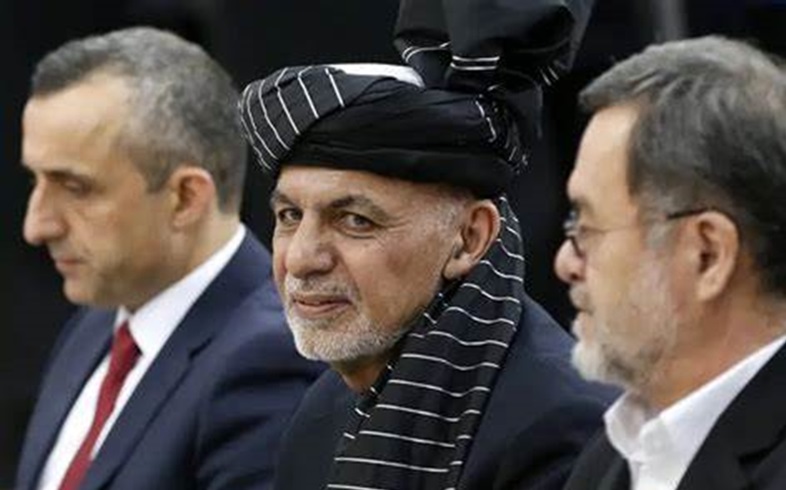We are on the third anniversary of Ashraf Ghani’s disgraceful escape which has led the discussions to the disastrous record of his government. These days, along with the analysis of the causes and roots of the downfall, memoirs from that time are also being published, which play a facilitating role in the correct understanding of why this government fell and Ghani and his companions fled abroad.
Undoubtedly, Karzai’s and Ghani’s “rhetorical” governments were neither democratic nor Islamic, because they did not have any of the features and characteristics of these two types of systems. In democratic and democratic governments, people and citizens are at the center of politics, and individual freedoms, freedom of speech and opinion, protest and advocating are the main characteristics of this type of government. The bitter experience of the governments of Karzai and Ghani is a good indication of the fact that in the apparently democratic governments of these two ” tyrannical kings”, the people were on the sidelines of the discussion and the demands of the people and citizens were devoid of value.
We have named the corrupt and illegitimate governments of the republican system as “slogan government” because the words and actions of the leaders of these governments showed many differences. The predatory and deceitful politicians of the republican governments, on the surface, talked about democracy, freedom of speech and opinion, individual freedoms, the values of human rights and citizen’s rights, but in practice, like an authoritarian government, all the protests for the rights of the people and citizens were suppressed by using all government tools. Of course, it must be said that the characteristic of “ethnicism” and “tribalism” of these governments also created exceptions. For example, sometimes a very small protest movement of dozens of people whose demands were in the direction of the ethnic and tribal policies of the government was paid a high price and the government gave a positive response to it as soon as possible, while the movements of millions of other citizens of the country were responded with containers and suicide.
One of the methods that the Ghani and Karzai governments used to neutralize civil protests and silence civil, social and political activists was bribery and blackmail. This method was very effective and at many times, it deceived many people and challenged many protest movements. Later, the profiteers of the society, realizing this issue, deliberately launched movements so that they could find a way to bargain and blackmail the government.
Many documents have been presented to prove this claim from the past until now. Especially in Bamyan province, which was at the center of civil litigation movements due to historical deprivation and experiencing systematic discrimination, many examples have been recorded in history.
Mr. Abdul Danishyar, one of the civil activists of Bamyan province, has recently published a memory about the efforts of the local government of Bamyan for bribery and extortion. We bring the exact text of which is presented here:
Like thousands of young people of my country, I fought with the hardships of the times; studies with thousands of problems such as lack of educational facilities; economic problems; staying in humid rooms; tolerating unfavorable and discriminatory behavior from professors and… I finished with the best grades. After graduating from university, with a group of young people with feelings and understanding, we took steps to establish educational centers in Herat and Bamyan, and fortunately, we had significant achievements.
Along with the educational programs, I turned to human rights activities and in my opinion, we did what I could with the cooperation of the good people of our people to realize the values of human rights, especially the elimination of systematic discrimination against our people. I consider some points to be remembered in this regard.
Here I want to proudly announce that I never betrayed my people; Although hundreds of times through popular elders; partisan; Ethnic and governmental, financial requests and governmental position were suggested, but I ignored them and did not spare any efforts for the rights of my people. An example of this was before the demonstration for Quddus and Mamorah; After the collective decision of the people to conduct a demonstration. On the night before the demonstration, five heads of government departments in Bamyan came to my house at 11:30 PM under the chairmanship of Mr. Asghari the head of Bamyan Finance Department (Mostofeyat). They broadcasted the voices of many elders to me over the phone, that they will not participate in the demonstration, and they also asked me not to participate in the demonstration, and in return, a market in front of the municipality address for me that the documents (possession document) will be given to me by the mayor this evening. This request was rejected by me and I said that I cannot deal on people’s interests. It happened and they left my house upset and after the case of 5th Qaws 1397, unfortunately, Mr. Asghari irresponsibly and cruelly claimed against me that I had caused 22 million Afghani damages to the government and told me many times that you will be punished heavily, because you ignored our coming and we were humiliated.
This is how a government with democratic slogans, but with a dictatorial and autocratic performance, stood against the people and their demands, and finally, this approach, along with many other factors, took the support of the people from the government and the national legitimacy of the government was also lost.
The fall of the republic was by no means sudden and unexpected, but what the governments of that time did made it very clear that the process of its fall has begun and will happen soon. The twenty-year history of the republican government is a great lesson for those who want to rule the people of Afghanistan now and in the future.











Read More
Even Iran’s Senior Team Couldn’t Overpower Afghanistan – The Fear Was Evident
The Impact of U.S. Aid Cuts to Afghanistan
The Damages of Widespread Migration of Afghans to Foreign Countries